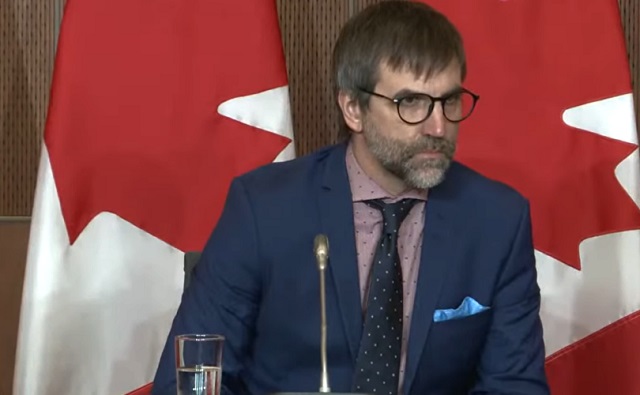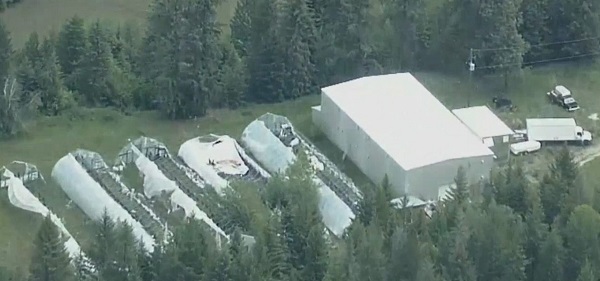Alberta
Trudeau gov’t pushing forward with net-zero regulations despite Supreme Court ruling

From LifeSiteNews
Environment Minister Steven Guilbeault claimed that a Supreme Court ruling returning power to the provinces does not affect federal plans to cap emissions from the oil and gas sector, nor the Clean Electricity Regulations.
The Liberal government is moving ahead with net-zero emission regulations despite a Supreme Court ruling restricting the federal government’s “no more pipelines” legislation.
On October 16, Environment Minister Steven Guilbeault declared that the Supreme Court ruling returning power to the provinces does not affect federal plans to cap emissions from the oil and gas sector, nor the Clean Electricity Regulations.
“The opinion of the court does not call into question other regulatory initiatives under development, and we are confident that they are within the purview of the federal government,” Guilbeault said in a statement to The Globe and Mail.
Guilbeault further claimed that the regulations are within Ottawa’s power to regulate as they are based on different federal authorities than the Impact Assessment Act.
The decision to press ahead with energy regulation comes on the heel of an October 13 ruling by the Canadian Supreme Court which found the Trudeau government’s 2019 Impact Assessment Act (IAA), dubbed the “no more pipelines” bill by critics, to be largely unconstitutional.
The Supreme Court declared that most of the IAA was unconstitutional with the exception of Sections 81 to 91, which refer to projects under federal authority on federal lands or outside Canada. Therefore, those projects would fall under federal jurisdiction and are not unconstitutional for the federal government to regulate.
However, the Court’s ruling did restore provincial autonomy over projects that don’t fall under federal jurisdiction, determining that the Trudeau government’s requirement that all provincial natural resource projects conform to the Liberals’ social and “climate change” policies is unconstitutional.
Guilbeault’s Monday statement comes as Canadians await the federal government’s amendment of the Canadian Environmental Protection Act, which is designed to phase out natural gas plants by 2030. The act is expected to be the means to implement the emissions cap and electricity regulations across the country.
His position echoes that of legal experts who warned that the Supreme Court’s decision will likely have no impact on other federal moves such as the Clean Electricity Regulations or oil sands emissions caps.
However, Guilbeault seems to be backtracking from his initial statement following the Supreme Court ruling; on that day, Guilbeault declared that the federal government is willing to “collaborate” with the provinces.
“We accept the court’s opinion,” he said during a virtual media meeting last Friday. “It provides new guidance on the Impact Assessment Act, while explicitly affirming the right of the government of Canada to put in place impact assessment legislation and collaborate with provinces on environmental protection.”
“We will now take this back and work quickly to improve the legislation through Parliament,” Guilbeault announced, but failed to give a timeline for the new legislation.
Alberta Premier Danielle Smith, a staunch opposer of Trudeau’s net-zero regulations, celebrated the court decision as returning power to the provinces.
“Today’s decision significantly strengthens our legal position,” Smith told reporters. “If they’re [the federal government] trying to pretend that they somehow still have the right to proceed with those offensive pieces of legislation that are clearly in our jurisdiction, they’re fooling themselves.”
Beyond the IAA, Alberta has been consistent in its fight against Trudeau’s push for increased energy regulations, with Smith repeatedly refusing to submit to the Liberal government’s demands, warning that Canadians could freeze in the winter if new “clean” electricity and energy regulations are enforced.
Late last month, Smith announced that she is preparing to use her province’s Sovereignty Act to fight the electricity regulations if the Trudeau government does not relent.
The draft version of the federal government’s “Clean Electricity Regulations” (CER) states that there will be billions in higher costs associated with a so-called “green” power transition, especially in the resource-rich provinces of Alberta, Saskatchewan, New Brunswick, and Nova Scotia, which use natural gas and coal to fuel power plants.
Business executives in Alberta’s energy sector have also warned that the Trudeau government’s fast-paced “green” transition could lead to unreliability in the power grid.
In addition to Smith, Saskatchewan Premier Scott Moe has likewise promised to fight back against Trudeau’s new regulations, saying recently that “Trudeau’s net-zero electricity regulations are unaffordable, unrealistic and unconstitutional.”
“They will drive electricity rates through the roof and leave Saskatchewan with an unreliable power supply. Our government will not let the federal government do that to the Saskatchewan people,” he charged.
The Trudeau government’s current environmental goals – in lockstep with the United Nations’ “2030 Agenda for Sustainable Development” – include phasing out coal-fired power plants, reducing fertilizer usage, and curbing natural gas use over the coming decades.
The reduction and eventual elimination of the use of so-called “fossil fuels” and a transition to unreliable “green” energy has also been pushed by the World Economic Forum (WEF) – the globalist group behind the socialist “Great Reset” agenda – an organization which Trudeau and some of his cabinet are involved.
Alberta
Alberta’s grand bargain with Canada includes a new pipeline to Prince Rupert

From Resource Now
Alberta renews call for West Coast oil pipeline amid shifting federal, geopolitical dynamics.
Just six months ago, talk of resurrecting some version of the Northern Gateway pipeline would have been unthinkable. But with the election of Donald Trump in the U.S. and Mark Carney in Canada, it’s now thinkable.
In fact, Alberta Premier Danielle Smith seems to be making Northern Gateway 2.0 a top priority and a condition for Alberta staying within the Canadian confederation and supporting Mark Carney’s vision of making Canada an Energy superpower. Thanks to Donald Trump threatening Canadian sovereignty and its economy, there has been a noticeable zeitgeist shift in Canada. There is growing support for the idea of leveraging Canada’s natural resources and diversifying export markets to make it less vulnerable to an unpredictable southern neighbour.
“I think the world has changed dramatically since Donald Trump got elected in November,” Smith said at a keynote address Wednesday at the Global Energy Show Canada in Calgary. “I think that’s changed the national conversation.” Smith said she has been encouraged by the tack Carney has taken since being elected Prime Minister, and hopes to see real action from Ottawa in the coming months to address what Smith said is serious encumbrances to Alberta’s oil sector, including Bill C-69, an oil and gas emissions cap and a West Coast tanker oil ban. “I’m going to give him some time to work with us and I’m going to be optimistic,” Smith said. Removing the West Coast moratorium on oil tankers would be the first step needed to building a new oil pipeline line from Alberta to Prince Rupert. “We cannot build a pipeline to the west coast if there is a tanker ban,” Smith said. The next step would be getting First Nations on board. “Indigenous peoples have been shut out of the energy economy for generations, and we are now putting them at the heart of it,” Smith said.
Alberta currently produces about 4.3 million barrels of oil per day. Had the Northern Gateway, Keystone XL and Energy East pipelines been built, Alberta could now be producing and exporting an additional 2.5 million barrels of oil per day. The original Northern Gateway Pipeline — killed outright by the Justin Trudeau government — would have terminated in Kitimat. Smith is now talking about a pipeline that would terminate in Prince Rupert. This may obviate some of the concerns that Kitimat posed with oil tankers negotiating Douglas Channel, and their potential impacts on the marine environment.
One of the biggest hurdles to a pipeline to Prince Rupert may be B.C. Premier David Eby. The B.C. NDP government has a history of opposing oil pipelines with tooth and nail. Asked in a fireside chat by Peter Mansbridge how she would get around the B.C. problem, Smith confidently said: “I’ll convince David Eby.”
“I’m sensitive to the issues that were raised before,” she added. One of those concerns was emissions. But the Alberta government and oil industry has struck a grand bargain with Ottawa: pipelines for emissions abatement through carbon capture and storage.
The industry and government propose multi-billion investments in CCUS. The Pathways Alliance project alone represents an investment of $10 to $20 billion. Smith noted that there is no economic value in pumping CO2 underground. It only becomes economically viable if the tradeoff is greater production and export capacity for Alberta oil. “If you couple it with a million-barrel-per-day pipeline, well that allows you $20 billion worth of revenue year after year,” she said. “All of a sudden a $20 billion cost to have to decarbonize, it looks a lot more attractive when you have a new source of revenue.” When asked about the Prince Rupert pipeline proposal, Eby has responded that there is currently no proponent, and that it is therefore a bridge to cross when there is actually a proposal. “I think what I’ve heard Premier Eby say is that there is no project and no proponent,” Smith said. “Well, that’s my job. There will be soon. “We’re working very hard on being able to get industry players to realize this time may be different.” “We’re working on getting a proponent and route.”
At a number of sessions during the conference, Mansbridge has repeatedly asked speakers about the Alberta secession movement, and whether it might scare off investment capital. Alberta has been using the threat of secession as a threat if Ottawa does not address some of the province’s long-standing grievances. Smith said she hopes Carney takes it seriously. “I hope the prime minister doesn’t want to test it,” Smith said during a scrum with reporters. “I take it seriously. I have never seen separatist sentiment be as high as it is now. “I’ve also seen it dissipate when Ottawa addresses the concerns Alberta has.” She added that, if Carney wants a true nation-building project to fast-track, she can’t think of a better one than a new West Coast pipeline. “I can’t imagine that there will be another project on the national list that will generate as much revenue, as much GDP, as many high paying jobs as a bitumen pipeline to the coast.”
Alberta
Alberta Premier Danielle Smith Discusses Moving Energy Forward at the Global Energy Show in Calgary

From Energy Now
At the energy conference in Calgary, Alberta Premier Danielle Smith pressed the case for building infrastructure to move provincial products to international markets, via a transportation and energy corridor to British Columbia.
“The anchor tenant for this corridor must be a 42-inch pipeline, moving one million incremental barrels of oil to those global markets. And we can’t stop there,” she told the audience.
The premier reiterated her support for new pipelines north to Grays Bay in Nunavut, east to Churchill, Man., and potentially a new version of Energy East.
The discussion comes as Prime Minister Mark Carney and his government are assembling a list of major projects of national interest to fast-track for approval.
Carney has also pledged to establish a major project review office that would issue decisions within two years, instead of five.








